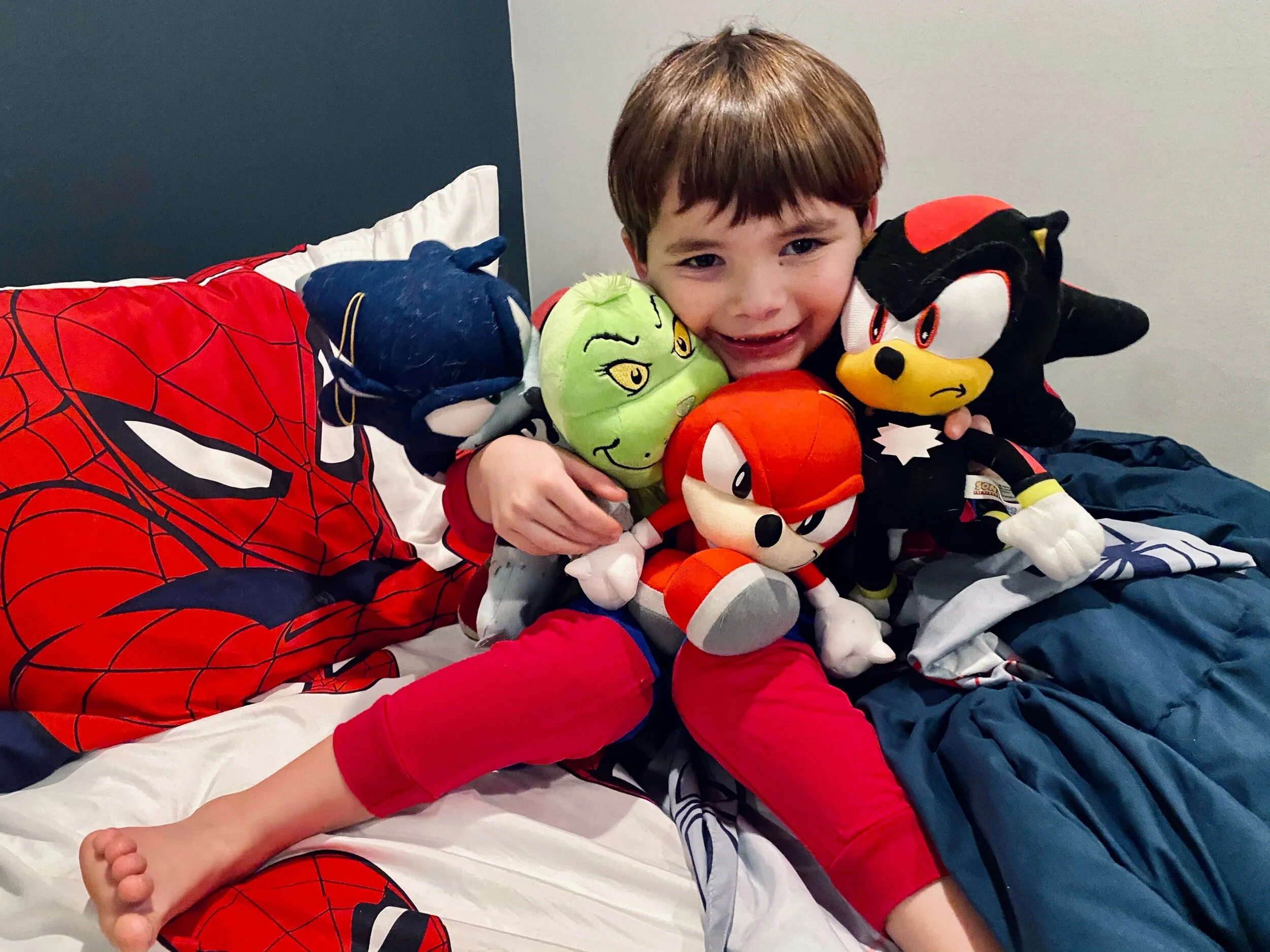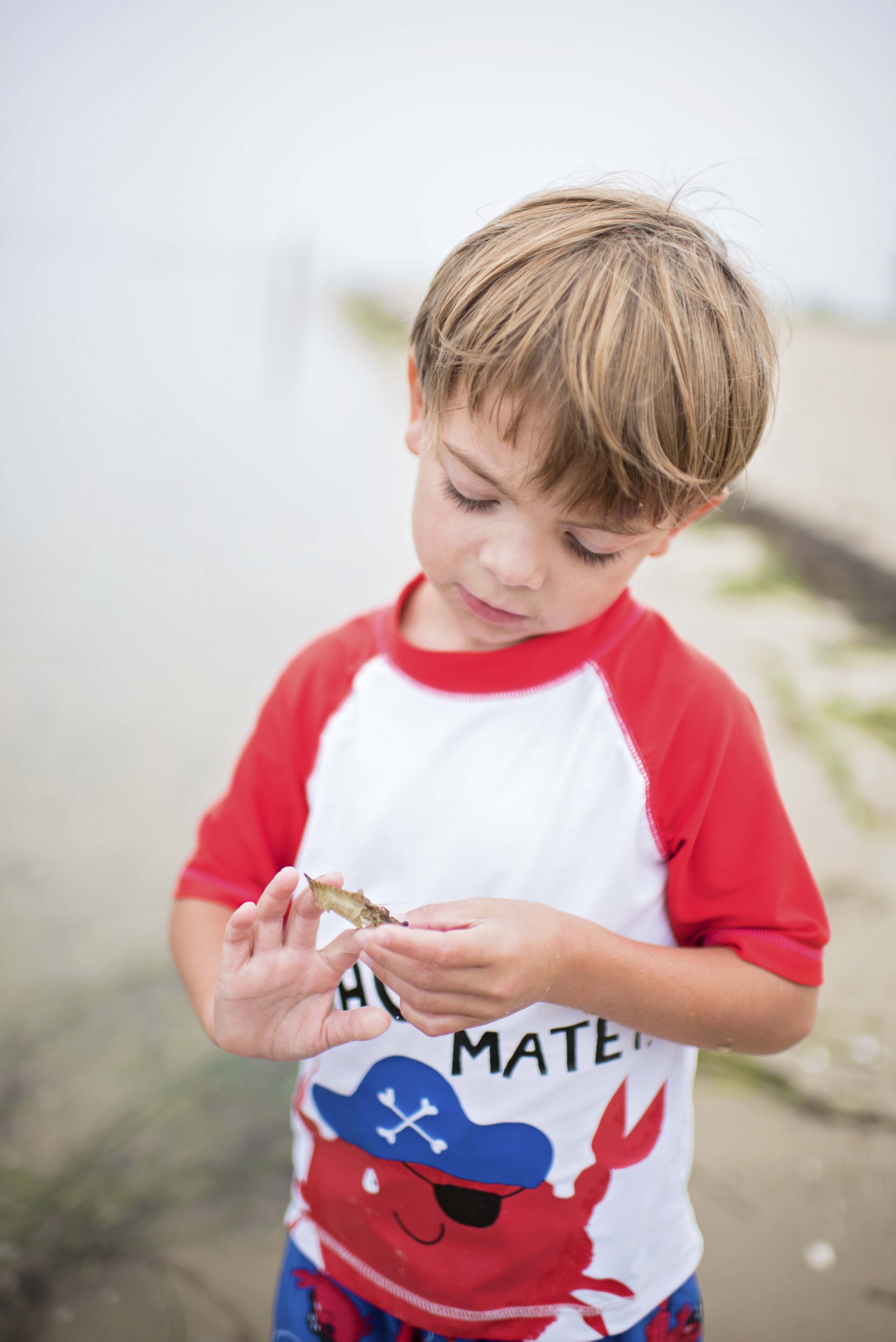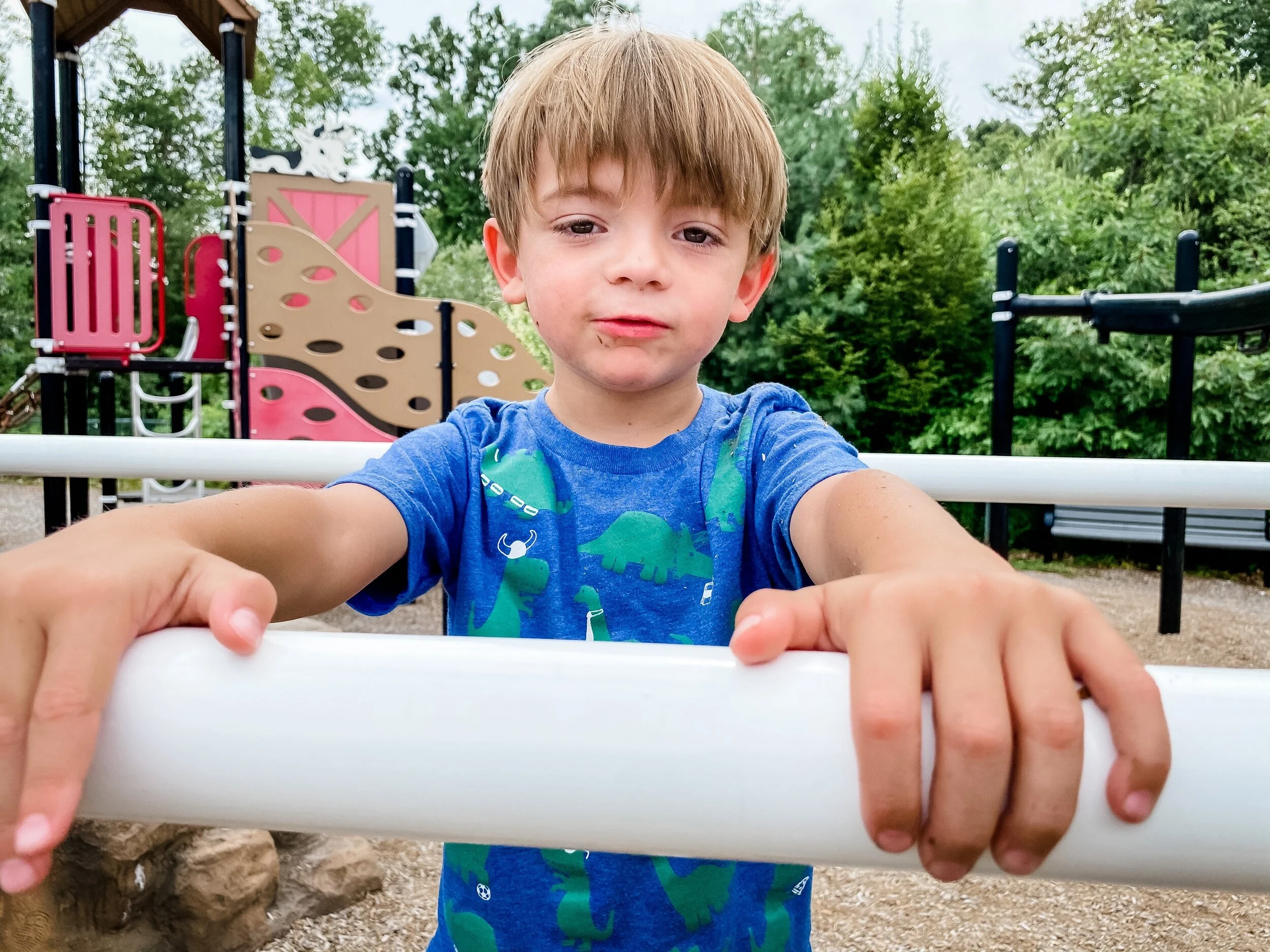There were so many moments after Alex first started to present similarities to her brothers, that I often questioned if what I thought I was adamant that I was seeing was in my head.
Each time she’d smile at me, or say, “love you, mommy” while seemingly locking solid eye contact, I’d hear that voice in my head question why on earth I thought she had autism. “She clearly loves fiercely and without hesitation, both thriving on connection, while also seeking it out,” I’d tell myself. “How could she possibly have autism?”
But then she’d leave the drawers in her room open again, even after I'd already closed them once behind her earlier in the day… and all the light switches had to be in the upright position, which typically meant she left a trail of leaving all the lights on in the house.
She’d rub the ears of her lovey with such repetition that she could tell which well-loved giraffe (as we’d purchased multiple the moment we realized that was her chosen comfort lovey) were those of her preferred version, or one that hadn’t been there for all the moments she needed her because her ears did not feel the traffic and wear and tear of her troublesome fingers.
On the rare occasion I’d have to tell our well-behaved and people pleaser of a daughter, no, she’d melt-down into a complete puddle of shame that would take upwards of 30+ minutes to exhaust herself so that we could comfort her out of it.
When I asked her teachers at school about if they were seeing similar behavior, they said not at all, and would beam with pride that she was one of their favorites and just such an easy going kid. Two of the most talented caregivers and educators I had seen to date, reassured me that Alex knew what was expected of her, and went through her days with ease and pride.
And when I pressed them, to provide explanations to why they were seeing what they were seeing at school: that they had a phenomenal routine with clear boundaries that children on the spectrum, particularly high functioning, would excel at because it was the same every day; and that yes, she was our carefree and fun loving kid because she had no problem playing by herself for hours, but at this age she should want to interact with her peers.
Her teachers did not know, because they paid attention to each of their students, and simply adapted how they worked with each of them to how they learned best. They saw Alex’s strengths, and played to them, working their hardest to always set her up for success. While they did push that she definitely needed to be evaluated for speech, as she was significantly behind her peers in that area, they thought that once the words would come, some of our concerns may fade.
The day care Alex was at when she turned 2, and is still fortunate to be at today, is an outstanding program, and she seriously scored the lottery with her teachers. I say this because without that knowledge, it may sound like I’m placing blame, which I am not. But you don’t know what you don’t know, even when you are as truly good as you are.
On “Celebrate Friends” day, when Alex didn’t want to take a photo with her peers, we were sent home the most adorable photo of her widest grin in between the two teachers she adored so much. After the initial “Awe, what a great photo” moment, as I scrolled the feed to see how her friends posed with their peers they chose, my inner voice spoke up saying “pay attention”.
On the day that I arrived to school to find my typically “she had a great day” welcome halted by my girl in a shame puddle, shoulders full closed over, knees in a V shape and head down while tears poured onto her lap, on top of the picnic table, I looked at her favorite teachers questioning the scene met with a smirk and response of: “We explained it’s not safe to dance on the table, and asked her to get down”. While simultaneously making my way to scoop that puddle of shame up into my arms and smother her with love, I laughed back “Oh dear, guess that’s one career we won’t be chasing, huh Ali girl!” putting all at ease while ensuring she felt safe in her spiral.
But then, on the day that I pushed back a bit, asking that they interrupt her routine and expect the unexpected from her, they suggested that maybe we were seeing certain behaviors at home because she was learning behavior from her brothers. In the moment I bit my tongue as tears of frustration and fear welded in my eyes, and did the best I could to just get Alex to the car without completely breaking down in defeat.
When it came time to have them fill out the forms the state requires of both parents and educators for an autism evaluation, looking to compare her behavior at school with her behavior at home, the comparison looked as if the forms were describing two different girls.
I want to reiterate here, that you don’t know what you don’t know. And when you love someone, especially the way I know these amazing women love our daughter, your mama bear defenses can go up, ready to argue anyone who says there’s something off with your cub. We couldn’t love them more for it, and we do understand why we were seeing what they weren’t.
But when it was finally time for Alex’s evaluation and my daughter and I sat in front of three new women whose job was to determine what they saw of the young girl in front of them, the conflicting forms gave room for the evaluators to see only the obvious, without taking any time to determine a behavioral baseline and understand what was in front of them.
Even after an hour and a half of observation, much discussion, and many questions looking for greater clarity regarding the discrepancy in the forms from school and home, the three doctors sat with confidence when they told me they saw no signs of autism in Alex.
I sat in disbelief as the doctors shared that the girl they saw in front of them had too much autonomy and confidence, worked too hard to engage, and had far too great of abstract thinking to possibly be on the spectrum.
When asked to give specific examples, as I had also been present for the entirety of the evaluation, very confused as to what I saw was so clearly different from what they saw, they shared the following confidently:
Alex displayed great autonomy as she completed the tasks asked of her at the table with one of the doctors, consistently looking back with pride and confidence to “show off” to mommy each time she got an answer right.
During the time when a doctor purposely ignored Alex, my daughter worked diligently to get her attention back by laughing loudly and asking the doctor “if she was so funny!”.
And then finally, as my greatest confusion in their conclusion sat on the concept that my three year-old who was struggling to find her words and communicate in general, could have too great of abstract thinking at this stage of her life, they said that she had no hesitation taking two objects that had nothing to do with each other to create a game that displayed her wits and creativity.
As every emotion swirled inside of me, I whispered to myself, you don’t know what you don’t know.
I gathered whatever strength I had left, trying to seem composed and unphased, and asked, “do you think you had enough time to determine a strong behavioral baseline to support those conclusions?”
The doctor’s posture stiffened, her arms crossed pinning her clipboard against her chest, and she said “I’ve diagnosed many girls on the spectrum over the years, and know what I’m not seeing.”
I nodded, trying to smile, but feeling sad for each girl like mine who had come in and performed exactly as she was taught, and been dismissed by this incredibly brilliant and impressive doctor (because she truly was).
As I rose from my chair to leave, and held my daughter’s hand tightly in my own, she gave me one final piece of advice: “you need to parent her like she is a neurotypical and she’ll act like she is a neurotypical.”
My heart still hurts as I sit in that memory.
I know how many lost and confused parents that very talented doctor comes across each day. I know because my wife and I were those parents when we had the boys evaluated. We had no idea. Those parents are looking to her to tell them what they don’t know, where this time around, I was dumbfounded that even when I explained what I saw, she refused to consider the possibility she did not know what she did not know.
I know that our daughter does not flap, or line her toys, or display a lack of interest or attention in human connection.
But I also know that our daughter has lived on her tiptoes since the day she could walk.
And that when we first got into that evaluation room, she looked to me in fear, but understood that when I told her “It’s ok, you’re safe”, that she was to go on and participate in the evaluation the way she had in the 4 similar sessions (during the last three months) with all female staffs, in white rooms, with random toys.
I knew that each time Alex looked back at me, displaying that “confident autonomy” the doctor (who’s Alex’s back was toward) was incorrect in reading her body language, and that Alex was looking for acknowledgement that she was participating and ensuring I saw that she was doing well, as that is what we people pleasers do - look for confirmation that we are doing it correctly.
I knew that when the doctor ignored her, my daughter got so nervous that she’d done something wrong, she performed what she knew (to make someone laugh) in order to not fail, because even at this young age my girl is in search of perfection, despite that had the doctor continued to not participate - or worst, told her that she had failed, she would have melted into a shame puddle and the session would have gone incredibly different.
I also knew, that my tomboy of a daughter, who only wore her brother’s clothes, and had no interest in dolls or dresses, knew just what to do with the snot sucker (plastic bubble tool that you literally put up a child’s nose to suck out their boogers), and nerf dart she was handed; not just because she is obsessed with her brothers and their interests, but because her very thoughtful uncle had brought three rocket kits as gifts just days before to play with each of them, where they worked for hours to put a styrofoam rocket (basically a very large nerf dart) onto a plastic tube that was connected to an air pocket that when jumped on, blasted that styrofoam rocket into the air.
Had the doctors looked at my child, the way her teachers did, as an individual to be evaluated not for what she might have in common with children typically known to be on the spectrum, but as the third in a family with diagnosed autism displaying textbook signs of what a high functioning girl on the spectrum displays at this age, they would have altered their standard testing for boys her age, and looked to get past what her behavioral baseline was, to see what the doctor who spent days with her only a month ago saw clearly.
But as we don’t know what we don’t know, I share this with you now, in the hopes someone else will learn what they need to in time for someone who’s parent hasn’t researched autism for 3 years, and whose child isn’t experiencing an academic interruption to where others may take notice.
This article sums up what I’ve learned to be true for high functioning girls on the spectrum who are hiding in plain sight.
Symptoms like delayed speech, meltdowns without an ability to self-regulate (or shame puddles as we call them), irritability/inability to be flexible with change, the need to self-sooth (by rubbing her lovey’s ears) despite a lack of displaying repetitive behaviors (like how Luca flaps), and attachment to certain objects despite not lining them up were all things we identified early on with Alex, and see in high definition since understanding how they display differently in boys and girls.
As I continue to share our journey, I’ll try to give greater detail of specific examples that may help break the stereotype that keeps so many of our girls hiding in plain sight but for now, the most important thing I hope to share is the importance of a behavioral baseline.
Often known as a mother’s intuition, a behavioral baseline is merely knowing what is typical for your child. When you know how your child typically acts, but find that in specific scenarios it is “more than her/his peers”, that’s when you can understand what neurodiverse wiring is.
When the “more than” becomes the standard, then there is a good reason to try to understand it further - both what is driving the behaviors to understand what the behavior is trying to communicate to you, but also if the behavior comes from a “can’t/can” or “won’t/will” perspective. Neurodiverse children simply can’t self-regulate, so what might look to some as a tantrum (or a child working to manipulate a scenario to get their way), is actually a meltdown (where a child can’t self-regulate and get out of their own way to calm down in an appropriate fashion).
The best way to know more than what you know is to get curious, really think through what you are asking, and try to ask a scenario in a few different ways. If all of the answers reiterate each other to be true, then the consistency should tell you there is fact behind it. If that fact is stating the child is experiencing an extreme difference than their neurotypical peers, there’s a good chance it’s because of the way they are wired.
During the last evaluation, when the same amazing teachers were given forms looking for what is formerly known as aspergers, their answers were very similar to our own. Yes, they had watched our girl experience many different shifts in routine, particularly after starting her speech therapy and participation in an inclusion classroom three times a week, only coming to them afterward.
Simple shifts like the fact that every Thursday morning she had to watcher her brothers get on the bus that she would get on each day of the beginning of the week, and she wasn’t allowed due to no class for her that morning, would create chaos for our girl until she could find her place in her known routine with her teachers. As these moments became more frequent, it was easy to recognize what we had been speaking about at home, especially on the day we had to take her to the actual evaluation, and were not able to get Alex to go into daycare afterward, despite working every strategy we knew of while she nearly stopped breathing because she cried so solidly in the car refusing to get out of her car seat.
These two teachers have now become even greater champions for our girl, and understand - and know - something they did not before. They know that we never once were trying to say something was wrong with our girl, or fight for a label that could create unwanted diversity for her for the rest of her life. They know that we knew she needed more than we could figure out on our own, and that there were programs out there that could help us create a map to follow to get her what she needs.
I know this was a lot to put into one blog post, and if you stayed with me- I appreciate you more than you know.
To all the girls who have grown up feeling lost and completely unsure of who you are; shameful for being known as dramatic despite how exhausted you are working to be what everyone else needs you to be; and know what it means to be frustrated for feeling so stupid despite knowing your intelligence that can’t be found in a moment of big emotion - I see you. You are not alone.
There is a generation of women learning about just what our wiring looks like, why it makes us understand a situation to be what it is, and as one of them willing to be completely vulnerable as I work to make sure my daughter knows she is worthy, enough, and protected, I promise you that any answers I find I will share with you. We are not alone in this. xo























































